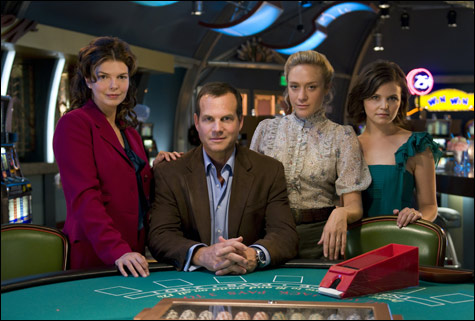
OPEN CODE To appreciate the nervy message of Big Love, replace the word "polygamy" with "same-sex marriage." |
Despite the comparably juicy family dysfunction it offers, Big Love hasn't achieved the iconic status of its HBO predecessor The Sopranos. Maybe viewers relate better to the mob than to Mormons. Or maybe it's a matter of tone. Big Love treats its main characters' religious faith — a Mormon sect following the church-outlawed practice of polygamy — with sympathy, not irony. But it's time viewers realized that Big Love isn't really about polygamy. It's about people who love one another yet face persecution, prosecution, and demonization for wanting to be a family. Hint: to appreciate the nervy message of Big Love, replace the word "polygamy" with "same-sex marriage."
Big Love was created by Mark V. Olsen and Will Scheffer, a long-time couple, and co-produced by gay former-Mormon screenwriter Dustin Lance Black (an Oscar winner for Milk). Before the series's 2006 debut, I asked Olsen whether polygamy was a metaphor for non-traditional families. He demurred that it was a "Rorschach" open to individual interpretation. But last season, in the wake of California's Proposition 8, the ballot measure that passed with significant financial and campaign help from Mormons and stripped the state's same-sex couples of the right to marry, Big Love amped up the marriage-equality parallel.
It rejected bitterness, however, in favor of common ground. In "Come, Ye Saints," the ever-decent Bill Henrickson (Bill Paxton) took his three wives and nine children on a road trip along the route traveled by Mormon founder Joseph Smith and his followers. During their pilgrimage, the Henricksons encountered prejudice and suspicion, just like their Mormon forebears, and just like the same-sex-marriage pioneers demonized by supporters of Proposition 8 and Maine's Proposition 1. In "Outer Darkness," wife #1, Barb (Jeanne Tripplehorn), was excommunicated by Church of Latter Day Saints leaders for refusing to renounce the "abomination" of polygamy, and her pain at being cast out and seeing her family delegitimized was wrenching to watch. "I believe that the church and its leaders are in grave error on polygamy and the kinds of marriages and families it creates!" she cried.
In the fourth season — which premieres this Sunday, January 10, at 9 pm — the polygamy/same-sex marriage correlation continues, as a conservative politician crusades against plural marriage with rhetoric taken from the anti-gay playbook ("Their ranks are growing . . . violating the most basic precepts of decency and morality!"). Weary of being forced into secrecy, Bill ponders running for office — you can't win hearts and minds by remaining isolated.
The metaphors are powerful, but, through lyrical writing and deft acting, Big Love also makes us care about the Henricksons as people. The balance of power among the women is shifting this season, as third wife Margene (Ginnifer Goodwin) acquires new clout thanks to her financial success as a TV-shopping-network personality. Middle wife Nicki (Chloë Sevigny) remains in miserable thrall to the father she loves/hates, Roman Grant (Harry Dean Stanton), the MIA "Prophet" of the backwoods Juniper Creek polygamous cult. And Nicki's closeted-gay brother Alby (Matt Ross), Roman's de facto successor, takes greater risks. Alby's tragic storyline needs no metaphor — this is what intolerance does to gay people, and it's not pretty. Yet Big Love rises above pessimism. In the Henricksons' fight to be a family, the show holds out hope of a love big enough to accept them just as they are.